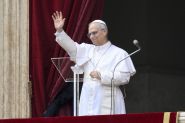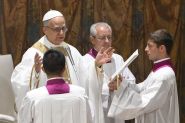- Home
- Middle East
- Pope Francis Dies at 88: A Legacy of Peace, Reform, and Compassion
Pope Francis, born Jorge Mario Bergoglio on December 17, 1936, in Buenos Aires, Argentina, passed away on Monday at the age of 88. The first pope from the Americas and the first Jesuit to lead the Roman Catholic Church, Francis leaves behind a profound legacy of humility, reform, and global outreach.
Humble Beginnings in Buenos Aires
The son of Italian immigrants, Jorge Mario Bergoglio grew up in a working-class neighborhood in Buenos Aires. From an early age, he was marked by deep faith and a strong commitment to service. In 1958, he entered the Society of Jesus (the Jesuits), beginning a remarkable spiritual and intellectual journey. He studied theology, philosophy, and literature and was ordained a priest in 1969.
Bergoglio’s rise within the Church was swift. He taught in seminaries and served in pastoral roles, eventually being appointed auxiliary bishop of Buenos Aires in 1992 and archbishop in 1998. He became known for his advocacy for the poor and his outspoken stance on social justice, particularly during Argentina’s years under military dictatorship.
A Papacy of Simplicity and Reform
On March 13, 2013, Bergoglio was elected pope, choosing the name Francis in honor of Saint Francis of Assisi. His election was historic—not only was he the first pontiff from Latin America, but he also became a symbol of renewal in a Church yearning for change.
Pope Francis broke with many traditional customs. He chose to reside in the modest Santa Marta guesthouse rather than the Apostolic Palace and frequently used simple transportation instead of the papal limousine. His gestures of humility resonated around the world and helped reset the image of the papacy.
Throughout his papacy, Francis emphasized pastoral care over doctrinal rigidity. He championed the poor, urged compassion for migrants, and called on the Church to become a "field hospital" that tends to the wounded. His landmark encyclical Laudato si’ in 2015 was a powerful appeal for environmental action, urging humanity to care for “our common home.”
Challenges and Global Engagement
Francis’s pontificate unfolded amid complex global crises. He responded to wars, natural disasters, and political repression with consistent calls for mercy, dialogue, and peace. He urged the world to act decisively against poverty and indifference and to embrace solidarity over division.
In 2015, he declared the Jubilee Year of Mercy, encouraging forgiveness and reconciliation. He also launched bold reforms within the Vatican, seeking transparency and accountability in Church governance and finances. Despite opposition from within, he remained committed to building a Church closer to the people.
Francis also made significant strides in interfaith relations. In a historic 2019 visit to Abu Dhabi, he signed a joint declaration on human fraternity with the Grand Imam of Al-Azhar, marking a milestone in Catholic-Muslim dialogue.
A Final Blessing
On Easter Sunday, April 20, 2025, nearly 50,000 worshippers gathered in St. Peter’s Square. Though visibly frail and confined to a wheelchair, the Pope delivered a brief but heartfelt message of peace. He delegated the traditional Urbi et Orbi address to Monsignor Diego Ravelli but offered his final blessing to the world. “Let us dare to hope again that peace is possible,” he said, calling for an end to violence in the Middle East, Ukraine, and beyond.
His last public appearance was seen by many as a powerful closing chapter—an image of perseverance and spiritual strength amid declining health. Just weeks earlier, he had been hospitalized for pneumonia, a condition complicated by a partial lung removal during his youth. He had been in and out of medical care in recent months but continued his duties as head of the Church until his death.
A Legacy That Transcends Borders
Pope Francis will be remembered not only as a reformer and a moral leader but as a spiritual figure who brought compassion, humility, and urgency to some of the world’s most pressing issues. His commitment to dialogue, justice, and ecological responsibility reshaped the papacy for the 21st century.
As the Church and the world bid farewell, his legacy endures: a voice for the voiceless, a bridge between faiths, and a relentless advocate for peace and hope.
Read more




Comments